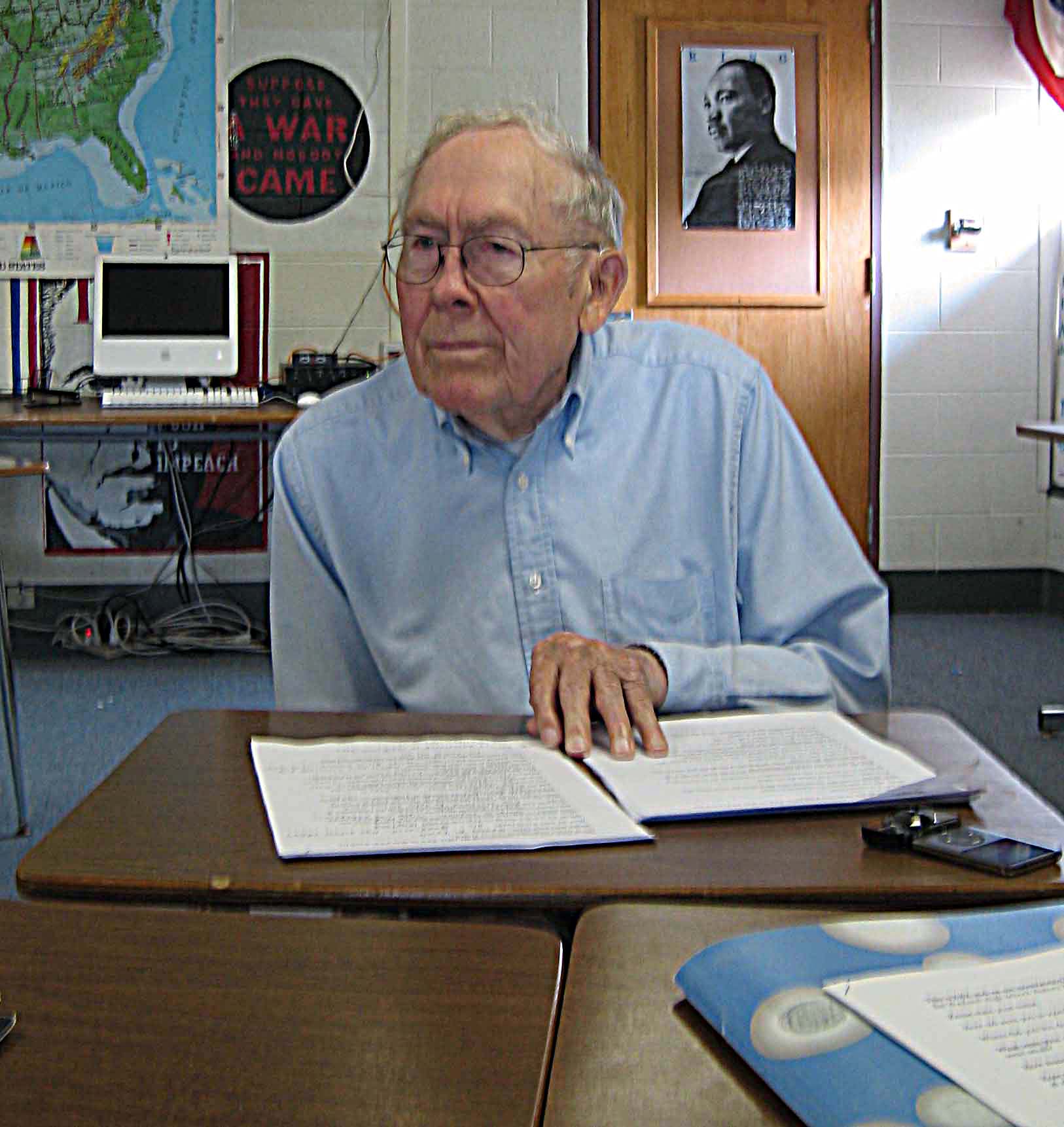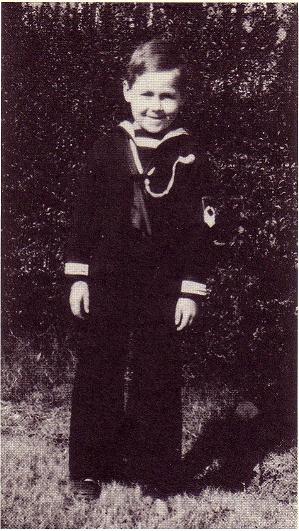Back to main interview page
|
George Lewis Kelsey Robb May 8, 2008 |
 |
|
|
|
|
George K. Lewis was born in 1923 in Wayland, MA. He grew up in Wayland during the Depression and was six years old in 1929 when the stock market crashed. Mr. Lewis’s parents’ were George W. Lewis, who worked as an engineer, and Alice M. Lewis, who worked as both a housewife and a part-time salesperson. He also had one older brother and one younger brother.
When asked how his mother was affected by the Depression, Mr. Lewis answered that much of her time was consumed by her job as a salesperson. She was also frustrated that she was unable to enjoy certain material pleasures of life, or the “extras”, as Mr. Lewis called them, and so this job was able to help appease this desire by giving her a little extra spending money of her own.
Although there were many layoffs during the Depression, Mr. Lewis said that his father managed to retain his job. However, as a means of preserving most of the workers’ jobs, his employers cut all of their employees’ wages, including Mr. Lewis’s. Mr. Lewis’s uncle was not so lucky, and lost his job. Despite the circumstances, his uncle refused to work at a lower position, and managed to survive the Depression without a job.
Living in the Lewis household involved mostly food prepared at home, not pre-made. Mr. Lewis claims he was a “very ‘fussy’ child” and didn’t touch spam. His family had a small garden, and would can tomatoes, green beans, and eggs.
The car of Wayland was the Chevrolet, but the Lewis’ owned a Ford Sedan. There were rarely foreign cars because, as Mr. Lewis puts it, they were a “luxury beyond belief.” Having a car gave the family a lot of freedom and mobility. They were able to go to movies, which was one of his mother’s favorite pastimes. The favorite family movie that Mr. Lewis spoke fondly of was “Gone With the Wind.” The family was also able to enjoy some weekend drives to visit relatives and do various activities.
Growing up, Mr. Lewis managed to acquire a few jobs of his own. He spent much of his summer mowing lawns, which he said was very good money, as well as picking beans, which was not quite as profitable. As a method of saving time and energy, Mr. Lewis said he used to make sure that the sack of beans he just picked did not settle because the workers were paid by the bag and he didn’t want to have to pick extra beans. Mr. Lewis saved his hard earned money and finally bought the camera he had been waiting for. He told us of one of his greatest adventures he had paddling a canoe down the Sudbury River. He says he remembers this exact day so vividly for a very particular reason; as he had been paddling the canoe, he lost balance and the boat tipped, dumping all of its contents, including Mr. Lewis and his beloved camera, into the Sudbury River. To this day, as far as he has knowledge, the camera still sits at the bottom of the river.
When Mr. Lewis was not working over the summer he spent much of his time outdoors. He said he would come home from work, have a quick snack that his mother had prepared for him, and then he’d be off somewhere in the wilderness, usually around Dudley Pond, observing the insects, trekking through the woods, or just taking in the scenery. Most days he wouldn’t come home until dinnertime later in the night.
One other job that Mr. Lewis had was with his neighbor who had a faulty boiler in her basement. A deal was made at the beginning of his work that if he continued to fix the boiler, his pay would be listening to a radio show. His parents disapproved of radios until the 1940’s, so this was a treat that was highly valued. He would listen to all sorts of things, including his favorite music of the time: swing.
Another of his favorite pastimes was chasing after fire trucks. Mr. Lewis lived very close to the station and he could here the alarms sounding before the trucks took off, so he’d be ready to follow after them when they emerged from the station. During these Depression years, because they knew very little about fire safety, many Wayland citizens lost their barns to a blaze. Mr. Lewis said that watching these barns burn down was not only a favorite pastime of his, but of many citizens of Wayland, and there would always be an audience as the firemen tried to douse the flames.
During school at recess, Mr. Lewis also used to enjoy playing marbles. Although he started out with clay marbles, which he described as the toys of “cavemen”, he said he eventually graduated to the glass marbles, which, as the years went on, became increasingly larger and more decorated. Marbles weren’t the only things being traded at school. The gun control laws were essentially non-existent, and students would bring their guns to school to show off and trade with each other. As for sports, Mr. Lewis played a lot of pick-up games, and received hand-me-down sports equipment from his older brother.
Mr. Lewis said he enjoyed school, although the Wayland school system at that time was not the best. His classroom was literally bisected into two grades, one on each side, with one teacher shared between the two classes. The Weston school system, which was endowed with much better funding, was sufficiently superior, so when thirty-five positions were offered to Wayland residents at the Weston Public Schools for a fee of $100, many Wayland parents jumped at the offer, including Mrs. Lewis. So Mr. Lewis acquired the rest of his education in the Weston public school system.
The clothes of this era were more along the lines of “Huck Finn,” as Mr. Lewis put it. They were much more traditional, and left a lot to the imagination. Today’s clothing is a bit more showy than the clothes of the 1930’s, as Mr. Lewis was quick to point out.
While the Lewis family was fairly well off during the Depression, not everyone in Wayland was. Mr. Lewis explained to us the horrors surrounding the shacks located on Dudley Pond. He emotionally described an experience in which his mother’s friend came to their house, exclaiming, “I have just witnessed something that I thought I would never see.” The “shacks” around Dudley Pond were built as summer homes for the upper class, and were not equipped with any heating devices or any means of keeping a family warm during the winter. Unfortunately, with so many being thrown out of their homes, families had to move into these homes in the winter. Some froze to death, others burned when their gas heaters were too much for the small shack they called home. Mr. Lewis, visibly upset from the memory, said it changed his perspective on a lot of things.
Mr. Lewis also had a lot of heroes as a child. Some that he mentioned were Charles Lindberg, Amelia Earhart, and Don Rowand. A bit more interesting was his mention of World War I veterans. Mr. Lewis looked up to these men, and felt a strong compassion towards them and everything they had done for our country. For him, there was also an extra sense of status if the veterans had been gassed at some point during the war.
Growing up in central Wayland, Mr. Lewis was afraid of the “Coch Kids.” These were the children who grew up in Cochituate, which is part of the southern end of Wayland. He told stories of being beaten up by these bullies, and talked about how afraid he was to go to that part of town for fear of being beaten up again. There was also even more of a rivalry between the two sections of town, as they played each other in activities and sports.
In 1935 Mr. Lewis was part of the WPA project to build a new Wayland High School. The entire community came together, and Mr. Lewis remembers how good it felt once the school was finally finished. This remained Wayland’s high school until it was replaced in 1960 by the current campus. Mr. Lewis also remembers other construction projects of the time, like the Golden Gate Bridge, the Hoover Dam, and the Empire State Building. Mr. Lewis was also part of another New Deal program working on the Federal Writers program. He did the geography and history of every state.
Although he grew up in this time period, Mr. Lewis didn’t have a lot to say about President Roosevelt. Politics were not often discussed in his house, but he does mention that his father was sympathetic to socialists and that Roosevelt was dramatic, very controversial and disliked. Mr. Lewis also adds that he remembers Eleanor Roosevelt, and that she was a very busy and active person. His religious beliefs and faith were not very strong as a child, so they were not impacted at all by the Great Depression.
In the end, Mr. Lewis looks back at the hard times of the 1930’s as generally good times; the days of his youth when excitement and adventure abounded despite the difficulties that many folks faced.






